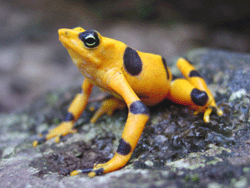A National Symbol of Panama and Now Extinct in the Wild: The Panamanian Golden Frog.
Celebrating 50 years of pioneering research and sharing an inspiring vision for our future, world-renowned primatologist and conservationist Dr. Jane Goodall renews her faith in nature and humanity during the “Gombe 50” anniversary.
“When I began in the early 1960s even the global scientific community wasn’t talking about—or really concerned with—conservation and environmentalism. Rainforests stretched across Africa and across the global equatorial belt but now these areas have become ever-decreasing fragments of forest. In turn, wild animal populations have suffered. Wild chimps, for example, numbered an estimated one to two million in 1900 and now there are fewer than 300,000 spread across 21 nations. The numbers of wild elephants, tigers, gorillas, rhinos, etc. have all decreased by horrific percentages.
For me, the big change in regard to my take on conservation began in the late 1980s when I realized that the problems of deforestation had come right to the borders of Gombe. I came to realize that all across Africa the chimpanzees and their forests were in real trouble. The need to reverse this catastrophic trend is what caused me to make the hard decision to leave the life that I loved out in the forest, working with the chimps in the field of primate research. Now I travel an average of 300 days a year with the mission to give people hope: ‘We can pull through our shared environmental challenges if we work together.’
The really good news is that over the past 50 years people have begun to see that the world is interconnected and that preserving the environment is a responsibility shared by all……”
“And there are all kinds of wonderful conservation groups across the globe. In your part of the world (California) there are groups like the Wildlife Conservation Network, and new projects like ecoReserve, which will allow a greater number of people to participate directly in global conservation through ‘micro-conservation’ projects. There are so many opportunities for people to step up in a positive, lasting and meaningful way—to think globally and live locally.”
Read the full interview at Mongabay

